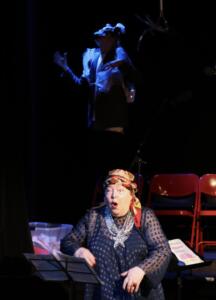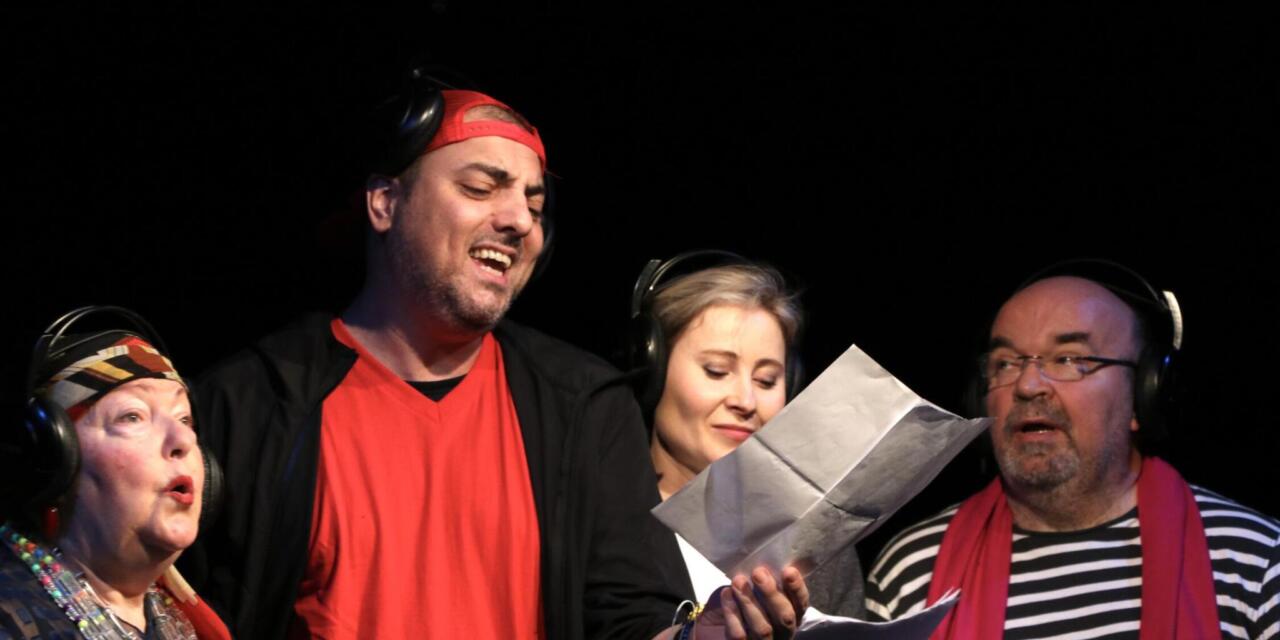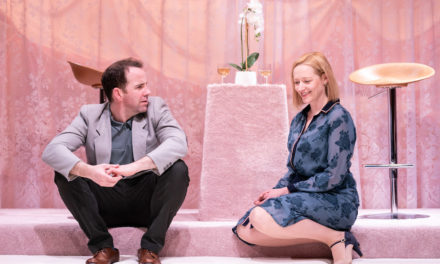“All the world’s a stage,” says a character in William Shakespeare’s “As You Like It.” “Life is theater,” as we say today. “I want to see meaning in theater,” says young actress Zulla, one of the characters in Slava Stepnov’s new play “Zhopkin khor” (“Flawed Choir”), which premiered at the Steps Theatre in New York, directed by Stepnov himself, on May 19, 2022.
While the lives of the characters—unsuccessful immigrant actors—seem to make little sense, the theater (or choir, if you will) in which they perform has many layers of meaning. The meaning of the play has already been pondered by critics, including myself. In this review, I would like to focus on the play’s unique Chekhovian quality—its universal appeal and, at the same time, its essential Russianness.

Left to right: Timothy Kompanchenko (Iraklii) and Elena Che (Zulla). 2022 © Mark Polyakov.
Stepnov’s plot is Chekhovian: uneventful but with a twist. Four Russian émigré actors—Adelaida (played by Yelena Stroganova), Roosevelt (a.k.a. Rodion, Kostiantyn Mishchenko), Zulla (Elena Che), and Iraklii (Timothy Kompanchenko)—meet at a Russian radio studio in New York’s Brighton Beach to record commercials. For two acts of the play, they do their job on stage, rehearsing and recording commercials, directed by the voice of an invisible producer (Svitlana Tiutiunyk). During breaks between recordings, they are immersed in the turmoil of their immigrant lives: they gossip, vent their rage and despair, fight, laugh, weep, and even have heart attacks. Suddenly, they hear about the last wish of their recently deceased Master, their beloved teacher, leader, and theater director. He wanted them to sing his favorite song a cappella at his funeral. None of them but Zulla is willing or ready—yet in the finale, they sing.

Foreground: Yelena Stroganova (Adelaida); background: Elena Che (Zulla as Death). 2022 © Mark Polyakov.
The characters seem to complement (sometimes, even to complete) the story arcs of Chekhov characters by adding possible behind-the-scenes episodes and connecting different characters across the plays. Thus, the accomplished actress Adelaida may represent the émigré life of Irina Arkadina (“Seagull”), young actress Zulla may show the details of the theatrical career path of Nina Zarechnaia (“Seagull”), and Roosevelt—desperate yet optimistic, a theater professional but dilettante in real life—may be a version of both Boris Trigorin (“Seagull”) and Boris Simeonov-Pishchik (“Cherry Orchard”). The “Flawed Choir” could be a prequel of “The Seagull,” showing the dramatic struggles of Iraklii (“Flawed Choir”), which finally lead Konstantin Treplev (“Seagull”) to take his own life. The “Flawed Choir” could also be a sequel to the “Cherry Orchard,” showing what the future might look like after the past (represented by the Firs in the “Cherry Orchard” and the Master in the “Flawed Choir”) has vanished.
Unlike Chekhov’s context—Russia—the context of the “Flawed Choir” is Brighton Beach, “Little Russia” or Russian America. Adelaida, Zulla, Roosevelt, and Iraklii are emigrants and immigrants—unsuccessful ones. They never really leave the old country, nor really arrive in the new one. Moreover, they have lost their purpose: the theater, including the stage and audience. This uprootedness is embodied in a set designed by Mark Polyakov. For almost the full length of the show, the actors are uncomfortably perched on bar stools, not even on the stage but in front of it. They act with their backs to rows of empty seats placed on the stage. They are stuck in a liminal space, as if unable to finally arrive in America and start a new theater. They end up on Brighton Beach, recording commercials at a radio studio. Instead of an actual live director, they are led by a voice over a loudspeaker like in an airport, the ultimate liminal space.

Left to right: Yelena Stroganova (Adelaida), Timothy Kompanchenko (Iraklii), Elena Che (Zulla), and Kostiantyn Mishchenko (Roosevelt). 2022 © Mark Polyakov.
Feelings of displacement, loneliness, alienation, uprootedness and liminality are common to most immigrants and hence universal. The “Flawed Choir” digs deeper, to unearth the Russian dimension of these complex phenomena. Russians’ perpetual liminality seems to be inevitable. As mass emigration from Russia, especially in its most recent wave due to Russia’s invasion of Ukraine shows, many emigrants have a very clear idea of the place they left and why they emigrated, but most of them have no idea (except immediate, practical ones—wherever it’s the easiest) of where to go and for what reason. Thus, they leave but never fully arrive. Most importantly, however, we—emigrants and non-emigrants alike—seem to be stuck in liminal time. Therefore, the “Flawed Choir” is set in both a liminal space—Brighton Beach—and a liminal time—Halloween. One aspect of this popular North American holiday is honoring the dead in both respectful and humorous ways. Dressing in costumes and performing acts of improv comedy, such as trick-or-treating, brings the dead back to life, that is, remembers and appreciates them. Halloween was never popular, and for a long time never even heard of in Russia. The same is true for the underlying idea—at least on a national, collective level—of celebrating life by remembering and appreciating the dead. Therefore, the characters in the “Flawed Choir” can only superficially honor the tradition of the new country by readily (albeit for money) putting on Halloween masks, but at the same time, they are appalled (even for money!) at the opportunity of honoring their beloved dead Master. Unable to acknowledge the death of the Master and to honor him, to overcome the past and to work for the future, they get stuck in the present, without a past or future. Instead of acting on stage, they will forever record Russian commercials and entertain at Russian parties as costumed characters. Iraklii’s play will never be completed nor produced. They are doomed to sit for eternity on their bar stools in front of hanging microphones—a typical set for stand-up comedy—discussing their endless misfortunes instead of joking, being miserable and ridiculous instead of lively and funny.
However, unlike in Chekhov’s dramas (which the author himself subtitled “comedies”), where the cherry orchard has been cut down and the seagull has been shot, the “Flawed Choir” has an almost happy ending: the choir is formed, as Adelaida, Zulla, Roosevelt, and Iraklii end up singing in the finale. This is an optimistic yet open ending: the actors mime being a choir, silently, without words. It is up to us to find those (Russian) words.
This post was written by the author in their personal capacity.The opinions expressed in this article are the author’s own and do not reflect the view of The Theatre Times, their staff or collaborators.
This post was written by Vassili Schedrin.
The views expressed here belong to the author and do not necessarily reflect our views and opinions.


















